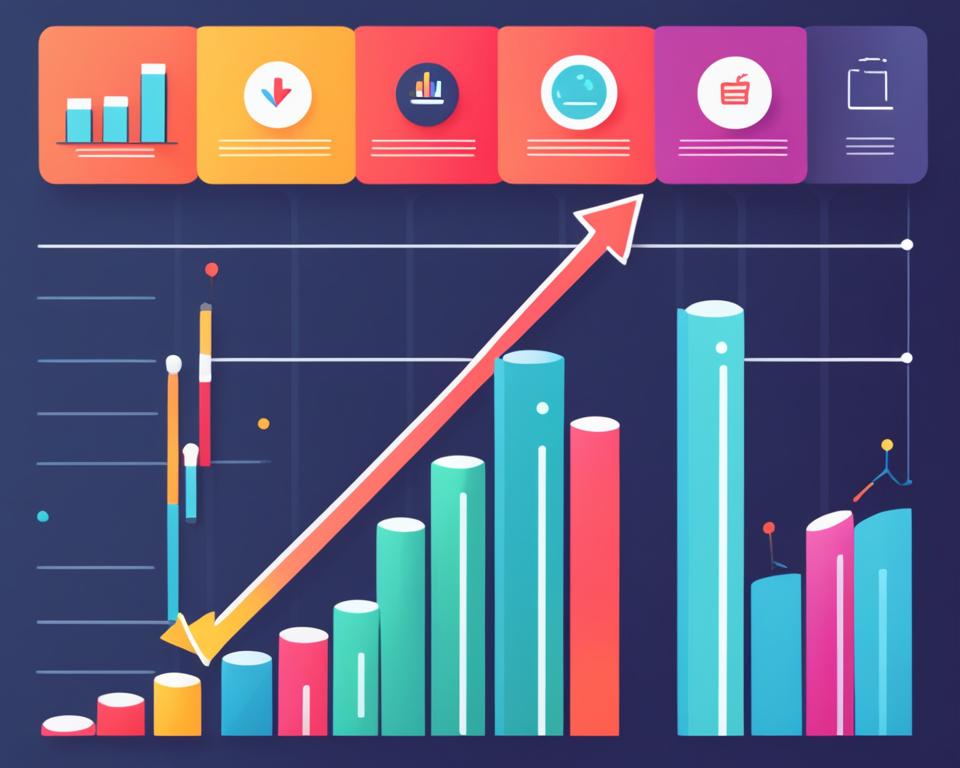In today’s digital world, your personal data is very valuable. It includes your browsing history, online shopping, social media, and location data. This information is key for businesses and marketers, and for the data economy as a whole.
As you move through this digital landscape, it’s important to grasp the value of your data. Knowing this can help you use it wisely.
Key Takeaways
- Your personal data is a valuable commodity in the digital age.
- Businesses and marketers rely on data-driven insights to drive their strategies.
- Understanding the worth of your data can empower you to take control of your digital footprint.
- Properly managing and monetizing your data can provide financial benefits.
- Safeguarding your privacy is essential in the era of data commodification.
The Rise of Data as a Valuable Resource
In today’s digital world, data has become a highly sought-after asset. It has grown from a simple byproduct to a valuable resource. The growth of digital platforms and connected devices has led to a huge increase in data generation. Businesses now see the great value in data-driven insights, which help in making strategic decisions and targeted marketing.
Data’s Transformation from Byproduct to Prized Asset
What was once seen as a side effect of digital interactions is now a valuable resource. The rise of big data and advanced analytics has changed the game. Now, companies can extract valuable insights from large datasets, giving them a competitive edge.
The Increasing Demand for Data-Driven Insights
In the data economy, companies from all industries rely on data-driven insights to shape their strategies. They use data for everything from personalized product suggestions to predictive analytics. This ability to use data effectively is crucial in today’s fast-paced digital world.
The data economy is growing, and so is the need for quality, actionable data. It has become a valuable asset for both businesses and individuals. Understanding and using data wisely is essential for success in the digital age.
Understanding the Value of Your Personal Data
In today’s world, your personal info is very valuable. Companies and data brokers want it to improve their marketing and offer better services. Knowing how much your data is worth helps you deal with data monetization and data privacy issues.
Your data rights are key to controlling your personal info. By understanding your data’s value, you can use it wisely. This could mean making money from it or keeping it safe.
| Type of Personal Data | Estimated Value |
|---|---|
| Browsing History | $2.00 – $5.00 per user |
| Purchase History | $10.00 – $20.00 per user |
| Demographic Information | $0.50 – $1.50 per user |
| Location Data | $1.00 – $3.00 per user |
These numbers show the value of personal data. But, the real value depends on the data and its use. Knowing your data’s worth helps you protect it and keep control over it.
“Your data is the new oil – a valuable resource that can be refined and used. The key is to ensure you are the one benefiting from its inherent worth.”

Your Data is the Ultimate Commodity
In today’s digital world, your data is the most valuable thing. Businesses and organizations want it badly. They use it for their own benefit. Your personal info, what you browse, and how you act online are all valuable data as commodity in the data economy.
The personal data value of your online presence has grown a lot. Companies see its worth for targeted ads, personalized suggestions, and smart decisions. Your data is a key data monetization tool, helping the digital world grow and new business models pop up.
It’s key to know how valuable your personal info is. By understanding this, you can manage your digital identity better. You can share your data, make money from it, or partner with others.
| Data Type | Value in the Data Economy |
|---|---|
| Browsing History | Enables targeted advertising and product recommendations |
| Location Data | Informs location-based services and geotargeting |
| Purchase Records | Provides insights into consumer behavior and preferences |
| Social Media Activity | Allows for audience segmentation and social media marketing |
“Your data is the most valuable resource you have in the digital age. Understand its worth and take control of its potential.”
The data economy is always changing. The value of personal data and data monetization will keep growing. By seeing your data as the ultimate commodity, you can find new ways to make money, gain power, and control your digital life.

The Data Economy: Monetizing Your Information
The data economy has grown a lot. Now, there are many data brokers and platforms. They buy, sell, and trade personal data. They collect and package your info, then sell it to businesses for marketing and more.
Data Brokerage: Buying and Selling Personal Data
Data brokers collect and analyze consumer data. They get info from public records, social media, and online browsing. Then, they sell this data to others. You can share or sell your data to these brokers.
Leveraging Your Data for Financial Gain
You can make money from your data too. Some companies offer data-sharing programs for rewards or cash. You can also sell data like browsing history or purchase preferences.
| Data Type | Potential Value |
|---|---|
| Online browsing history | $0.10 – $1.00 per user |
| Purchase preferences | $0.50 – $5.00 per user |
| Location data | $0.20 – $2.00 per user |
By learning about the data economy, data brokerage, and how to monetize your personal data, you can make money from your info.

Protecting Your Data: Privacy Concerns and Strategies
In today’s digital world, your personal data is very valuable. As more people want data insights, worries about data privacy and data protection grow. It’s important to know your data rights and protect your info from misuse.
Knowing the data privacy laws in your area is key. These laws tell businesses how to handle your personal info. Knowing these rules helps protect your data rights and lets you deal with any issues.
Strong security steps are also vital. Use strong passwords, enable two-factor auth, and be careful with your online info. These steps help keep your data safe from wrong hands.
Also, think carefully about what info you share. Be picky about what you post online or give to services. Sharing less info means less chance of it being misused.
By valuing your data and protecting it, you can feel safe in the data economy. This way, you keep your data privacy and data rights safe.

| Data Privacy Best Practices | Data Security Measures |
|---|---|
|
|
By focusing on data privacy and using good data security steps, you can control your personal info. This way, you can move safely through the digital world.
The Future of Data: Emerging Trends and Implications
The data world is set for big changes, thanks to fast progress in data analytics and AI. These technologies will make your personal data even more valuable. You’ll see better decisions and more personalized experiences in the digital world.
Advancements in Data Analytics and AI
Advanced data analytics and AI will give us deep insights into what you like and need. Companies will use this info to offer products and services just for you. This mix of data and AI will change many industries, making things more efficient and opening up new chances for growth.
The Ethical Considerations of Data Commodification
But, the growing value of your personal data also raises big ethical questions. As your data becomes more valuable, protecting your privacy and getting your consent will be key. Finding the right balance between tech progress and your rights will be a big challenge. It will need work from policymakers, business leaders, and the public.















